|
PLearn 0.1
|
|
PLearn 0.1
|
Encapsulates the concept of a calendar as an ordered finite list of timestamps. More...
#include <Calendar.h>
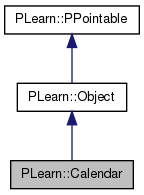
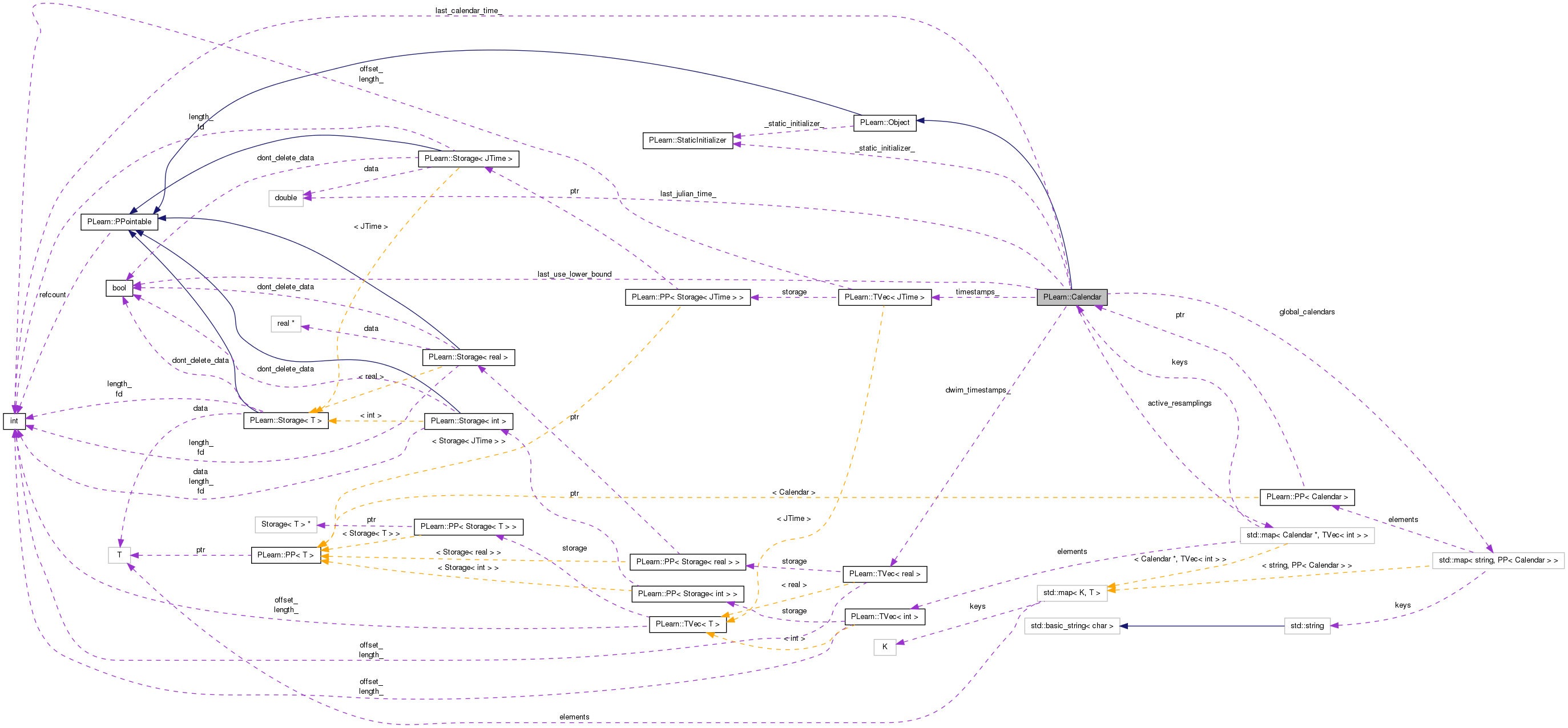
Public Member Functions | |
| Calendar () | |
| Default constructor. | |
| Calendar (const JTimeVec ×tamps) | |
| Constructor with specified timestamps (julian dates) | |
| virtual string | classname () const |
| virtual OptionList & | getOptionList () const |
| virtual OptionMap & | getOptionMap () const |
| virtual RemoteMethodMap & | getRemoteMethodMap () const |
| virtual Calendar * | deepCopy (CopiesMap &copies) const |
| virtual void | build () |
| Simply calls inherited::build() then build_(). | |
| virtual void | makeDeepCopyFromShallowCopy (CopiesMap &copies) |
| Transforms a shallow copy into a deep copy. | |
| bool | isEmpty () const |
| Returns true iff this calendar contains no timestamps. | |
| const JTimeVec & | getTimeStamps () const |
| Returns a reference to the timestamps. | |
| bool | operator== (const Calendar &cal) |
| Returns true iff the calendar have the exact same timestamps. | |
| bool | operator!= (const Calendar &cal) |
| Returns true iff the calendar has different timestamps. | |
| int | size () const |
| Returns the number of timestamps. | |
| JTime | getTime (CTime calendar_time) const |
| Returns timestamp corresponding to "calendar_time". | |
| JTime | operator[] (CTime calendar_time) const |
| CTime | getCalendarTime (JTime julian_time, bool use_lower_bound=true) const |
| Returns the calendar time corresponding to julian time "julian_time". | |
| CTime | getLastDayOfMonth (const PDate &day_of_the_month) const |
| Given a PDate D, returns the last calendar day in the same month than D. | |
| bool | containsTime (JTime julian_time, CTime *calendar_time=0) const |
| Returns true iff julian_time is a valid timestamp. | |
| JTime | calendarTimeOnOrAfter (JTime julian_time) const |
| Return the JTime of the day in the calendar that comes ON OR AFTER the specified day, or MAX_TIME if no such day exist. | |
| JTime | calendarTimeOnOrBefore (JTime julian_time) const |
| Return the JTime of the day in the calendar that comes ON OR BEFORE the specified day, or MIN_TIME if no such day exist. | |
| PCalendar | clamp (JTime lower, JTime upper) |
| Return the subset of dates of this calendar that that are between the given lower and upper times (both endpoints are included in the the subset). | |
| void | setResampling (Calendar *other_cal, const TVec< int > &resampling) |
| Associate or modify a resampling to another calendar. | |
| TVec< int > | getResampling (Calendar *other_cal) |
| Return the resampling to another calendar or an empty vector if it does not exist. | |
| void | remote_setGlobalCalendar (string calendar_name, Vec calendar_dates) |
| JTimeVec | remote_getGlobalCalendar (string calendar_name) |
Static Public Member Functions | |
| static PCalendar | makeCalendar (const Vec &dates) |
| This returns a calendar from a vector of "dates". | |
| static string | _classname_ () |
| static OptionList & | _getOptionList_ () |
| static RemoteMethodMap & | _getRemoteMethodMap_ () |
| static Object * | _new_instance_for_typemap_ () |
| static bool | _isa_ (const Object *o) |
| static void | _static_initialize_ () |
| static const PPath & | declaringFile () |
| static CTime | convertCalendarTime (const Calendar &source_calendar, const Calendar &dest_calendar, CTime source_time, bool use_lower_bound=true) |
| Converts a calendar. | |
| static PCalendar | unite (const TVec< PCalendar > &calendars) |
| Return the union of a set of calendars. | |
| static PCalendar | intersect (const TVec< PCalendar > &calendars) |
| Return the intersection of a set of calendars. | |
| static PCalendar | calendarDiff (const Calendar *cal, const JTimeVec &to_remove) |
| Return a new calendar containing the dates of a starting calendar MINUS the dates given in the list. | |
| static void | setGlobalCalendar (const string &calendar_name, PCalendar calendar) |
| Set a global calendar keyed to the given string. | |
| static const Calendar * | getGlobalCalendar (const string &calendar_name) |
| Return a pointer to the global calendar given the string. | |
Public Attributes | |
| JTimeVec | timestamps_ |
| The list of julian timestamps that define this calendar. | |
| Vec | dwim_timestamps_ |
| Alternative list of "human timestamps" that may be provided in any of the following formats: Julian, CYYMMDD, YYYYMMDD. | |
Static Public Attributes | |
| static StaticInitializer | _static_initializer_ |
Static Protected Member Functions | |
| static void | declareOptions (OptionList &ol) |
| Declares this class' options. | |
| static void | declareMethods (RemoteMethodMap &rmm) |
| Declare the methods that are remote-callable. | |
Protected Attributes | |
| JTime | last_julian_time_ |
| Input value to last call to getCalendarTime. | |
| CTime | last_calendar_time_ |
| Value returned by last call to getCalendarTime. | |
| bool | last_use_lower_bound |
| Last argument used when calling getCalendarTime. | |
| map< Calendar *, TVec< int > > | active_resamplings |
| Internal map containing memoized resamplings for the calendar. | |
Static Protected Attributes | |
| static map< string, PP < Calendar > > | global_calendars |
| The set of currently-installed global calendars. | |
Private Types | |
| typedef Object | inherited |
Private Member Functions | |
| void | build_ () |
| This does the actual building. | |
Encapsulates the concept of a calendar as an ordered finite list of timestamps.
This class encapsulates the concept of a calendar as an ordered finite list of timestamps. The idea is to provide a tool to convert a continuous representation of time (as julian dates) into a discrete one. Not only the calendar time units (CTime) are different, but the time axis may "leap-over" time ranges in the continous time (JTime) axis.
For instance, one may want to represent a conception of time where time is sampled daily but only during business week days (i.e. monday to friday) s.t. when time t is a friday, time (t+1) will be the next monday (and not saturday). Such a calendar would contain, in its internal representation, a list of timestamps that correspond to, say, Midnight of every Mon/Tues/Wednes/Thurs/Fri-days from, say, 1900 to 2099.
In addition, the class supports a set of global (static) calendars keyed by a string. Functions are provided to set/get global calendars associated with string keys. A Remote-Method interface is provided as well to set global calendars. Special operators are available in VMatLanguage to access those global calendars.
Definition at line 122 of file Calendar.h.
typedef Object PLearn::Calendar::inherited [private] |
Reimplemented from PLearn::Object.
Definition at line 125 of file Calendar.h.
| PLearn::Calendar::Calendar | ( | ) |
Default constructor.
Definition at line 83 of file Calendar.cc.
Referenced by calendarDiff(), clamp(), intersect(), makeCalendar(), and unite().
: inherited(), last_julian_time_(MISSING_VALUE), last_calendar_time_(-1), last_use_lower_bound(false), timestamps_() { }

| PLearn::Calendar::Calendar | ( | const JTimeVec & | timestamps | ) |
Constructor with specified timestamps (julian dates)
Definition at line 91 of file Calendar.cc.
References build_().
: inherited(), last_julian_time_(MISSING_VALUE), last_calendar_time_(-1), last_use_lower_bound(false), timestamps_(timestamps) { build_(); }

| string PLearn::Calendar::_classname_ | ( | ) | [static] |
Reimplemented from PLearn::Object.
Definition at line 76 of file Calendar.cc.
| OptionList & PLearn::Calendar::_getOptionList_ | ( | ) | [static] |
Reimplemented from PLearn::Object.
Definition at line 76 of file Calendar.cc.
| RemoteMethodMap & PLearn::Calendar::_getRemoteMethodMap_ | ( | ) | [static] |
Reimplemented from PLearn::Object.
Definition at line 76 of file Calendar.cc.
Reimplemented from PLearn::Object.
Definition at line 76 of file Calendar.cc.
| Object * PLearn::Calendar::_new_instance_for_typemap_ | ( | ) | [static] |
Reimplemented from PLearn::Object.
Definition at line 76 of file Calendar.cc.
| StaticInitializer Calendar::_static_initializer_ & PLearn::Calendar::_static_initialize_ | ( | ) | [static] |
Reimplemented from PLearn::Object.
Definition at line 76 of file Calendar.cc.
| void PLearn::Calendar::build | ( | ) | [virtual] |
Simply calls inherited::build() then build_().
Reimplemented from PLearn::Object.
Definition at line 216 of file Calendar.cc.
References PLearn::Object::build(), and build_().
{
inherited::build();
build_();
}

| void PLearn::Calendar::build_ | ( | ) | [private] |
This does the actual building.
Reimplemented from PLearn::Object.
Definition at line 141 of file Calendar.cc.
References dwim_timestamps_, PLearn::fast_exact_is_equal(), i, PLearn::TVec< T >::length(), makeCalendar(), PLWARNING, PLearn::TVec< T >::size(), and timestamps_.
Referenced by build(), and Calendar().
{
// If we have dwim_timestamps_ and no timestamps_, fill latter from former
if (dwim_timestamps_.size() > 0 && timestamps_.size() == 0) {
PCalendar cal = makeCalendar(dwim_timestamps_);
timestamps_ = cal->timestamps_;
}
// perform some preventive checks
bool doublons = false;
bool disordered = false;
for (int i=1; i<timestamps_.length(); i++)
{
if (fast_exact_is_equal(timestamps_[i], timestamps_[i-1]))
{
doublons = true;
if (disordered) break;
}
else if (timestamps_[i] < timestamps_[i-1])
{
disordered = true;
if (doublons) break;
}
}
if (doublons)
PLWARNING("In Calendar::build_(), provided timestamps contained repetitions.\n"
"The calendar's behavior is therefore undefined. Please check it.");
if (disordered)
PLWARNING("In Calendar::build_(), provided timestamps were disordered.\n"
"The calendar's behavior is therefore undefined. Please check it.");
}
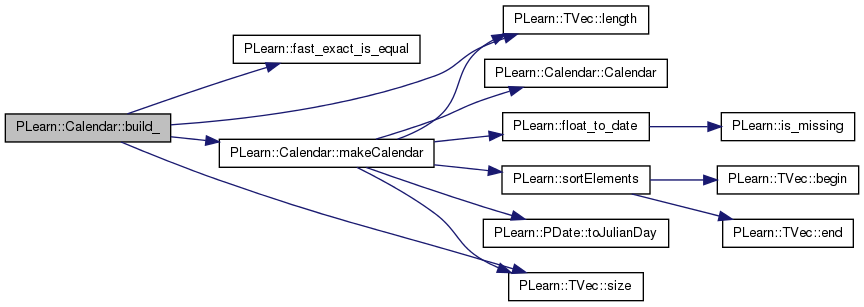

| PCalendar PLearn::Calendar::calendarDiff | ( | const Calendar * | cal, |
| const JTimeVec & | to_remove | ||
| ) | [static] |
Return a new calendar containing the dates of a starting calendar MINUS the dates given in the list.
Definition at line 380 of file Calendar.cc.
References PLearn::TVec< T >::begin(), Calendar(), std::copy(), PLearn::TVec< T >::end(), i, n, PLearn::TVec< T >::size(), and timestamps_.
{
set<JTime> cal_times(cal->timestamps_.begin(), cal->timestamps_.end());
for (int i=0, n=to_remove.size() ; i<n ; ++i)
cal_times.erase(to_remove[i]);
JTimeVec new_timestamps(int(cal_times.size()));
copy(cal_times.begin(), cal_times.end(), new_timestamps.begin());
return new Calendar(new_timestamps);
}
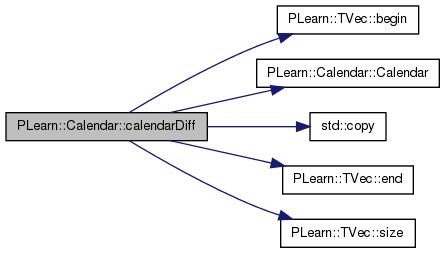
Return the JTime of the day in the calendar that comes ON OR AFTER the specified day, or MAX_TIME if no such day exist.
Definition at line 295 of file Calendar.cc.
References getCalendarTime(), getTime(), and PLearn::MAX_TIME.
Referenced by PLearn::VMatLanguage::run().
{
CTime start_point = getCalendarTime(julian_time);
if (getTime(start_point) < julian_time) // if at very end of calendar
return MAX_TIME;
else
return getTime(start_point);
}


Return the JTime of the day in the calendar that comes ON OR BEFORE the specified day, or MIN_TIME if no such day exist.
Definition at line 305 of file Calendar.cc.
References getCalendarTime(), getTime(), and PLearn::MIN_TIME.
Referenced by PLearn::VMatLanguage::run().
{
CTime start_point = getCalendarTime(julian_time);
while (start_point >= 0 && getTime(start_point) > julian_time)
start_point--;
if (start_point < 0)
return MIN_TIME;
else
return getTime(start_point);
}


Return the subset of dates of this calendar that that are between the given lower and upper times (both endpoints are included in the the subset).
Warning: a subVec into the original timestamps is returned -- a full copy of the vector is not made.
Definition at line 392 of file Calendar.cc.
References Calendar(), getCalendarTime(), PLASSERT, size(), PLearn::TVec< T >::subVec(), and timestamps_.
{
// Handle degenerate cases
if (size() == 0 || upper < (*this)[0] || lower > (*this)[size()-1])
return new Calendar;
CTime lower_ctime = getCalendarTime(lower, /* use_lower_bound= */ true);
CTime upper_ctime = getCalendarTime(upper, /* use_lower_bound= */ false);
if ((*this)[upper_ctime] > upper)
--upper_ctime;
PLASSERT( lower_ctime <= upper_ctime );
PLASSERT( (*this)[lower_ctime] >= lower );
PLASSERT( (*this)[upper_ctime] <= upper );
JTimeVec new_timestamps = timestamps_.subVec(lower_ctime,
upper_ctime - lower_ctime + 1);
return new Calendar(new_timestamps);
}

| string PLearn::Calendar::classname | ( | ) | const [virtual] |
Reimplemented from PLearn::Object.
Definition at line 76 of file Calendar.cc.
Returns true iff julian_time is a valid timestamp.
If specified, argument calendar_time will be filled with the right value if true and will be left unchanged if not.
Definition at line 281 of file Calendar.cc.
References PLearn::fast_exact_is_equal(), getCalendarTime(), and timestamps_.
{
CTime found = getCalendarTime(julian_time);
if (fast_exact_is_equal(timestamps_[found], julian_time))
{
if (calendar_time)
*calendar_time = found;
return true;
}
else
return false;
}

| CTime PLearn::Calendar::convertCalendarTime | ( | const Calendar & | source_calendar, |
| const Calendar & | dest_calendar, | ||
| CTime | source_time, | ||
| bool | use_lower_bound = true |
||
| ) | [static] |
Converts a calendar.
Definition at line 270 of file Calendar.cc.
References getCalendarTime(), getTime(), isEmpty(), and PLERROR.
{
if (source_calendar.isEmpty() || dest_calendar.isEmpty())
PLERROR("In convertCalendarTime(), one of the calendars is empty.");
return dest_calendar.getCalendarTime(source_calendar.getTime(source_time), use_lower_bound);
}

| void PLearn::Calendar::declareMethods | ( | RemoteMethodMap & | rmm | ) | [static, protected] |
Declare the methods that are remote-callable.
Reimplemented from PLearn::Object.
Definition at line 193 of file Calendar.cc.
References PLearn::Object::_getRemoteMethodMap_(), PLearn::declareMethod(), PLearn::RemoteMethodMap::inherited(), remote_getGlobalCalendar(), and remote_setGlobalCalendar().
{
// Insert a backpointer to remote methods; note that this
// different than for declareOptions()
rmm.inherited(inherited::_getRemoteMethodMap_());
declareMethod(
rmm, "setGlobalCalendar", &Calendar::remote_setGlobalCalendar,
(BodyDoc("Set a global calendar keyed to the given string.\n"
"The calendar is created if it does not already exist."),
ArgDoc ("calendar_name", "Name of the global calendar to be set"),
ArgDoc ("calendar_dates", "List of dates that belong to the calendar,\n"
"either in CYYMMDD or YYYYMMDD format")));
declareMethod(
rmm, "getGlobalCalendar", &Calendar::remote_getGlobalCalendar,
(BodyDoc("Return the dates that belong to the global calendar,\n"
"given its name"),
ArgDoc ("calendar_name", "Name of the global calendar to be accessed"),
RetDoc ("Set of dates that belong to the calendar, in PLearn\n"
"Julian Date format")));
}

| void PLearn::Calendar::declareOptions | ( | OptionList & | ol | ) | [static, protected] |
Declares this class' options.
Reimplemented from PLearn::Object.
Definition at line 173 of file Calendar.cc.
References PLearn::OptionBase::buildoption, PLearn::declareOption(), PLearn::Object::declareOptions(), dwim_timestamps_, and timestamps_.
{
declareOption(
ol, "timestamps", &Calendar::timestamps_,
OptionBase::buildoption,
"List of the time stamps (in julian time) that are the\n"
"skeleton of this calendar.");
declareOption(
ol, "dwim_timestamps", &Calendar::dwim_timestamps_,
OptionBase::buildoption,
"Alternative list of \"human timestamps\" that may be provided in any of\n"
"the following formats: Julian, CYYMMDD, YYYYMMDD. The format is\n"
"recognized automatically. The dates need not be sorted; they will be\n"
"sorted automatically. After construction of the calendar, the option\n"
"'timestamps' is filled out with the converted Julian timesteps.\n");
inherited::declareOptions(ol);
}

| static const PPath& PLearn::Calendar::declaringFile | ( | ) | [inline, static] |
Reimplemented from PLearn::Object.
Definition at line 191 of file Calendar.h.
{ return timestamps_.isEmpty(); }
Reimplemented from PLearn::Object.
Definition at line 76 of file Calendar.cc.
Returns the calendar time corresponding to julian time "julian_time".
If not found, returns the index of the first timestamp that is greater or equal to "julian_time", or the last index if "julian_time" is bigger than all of the timestamps. Returns an error if the calendar contains no timestamps.
Definition at line 228 of file Calendar.cc.
References PLearn::TVec< T >::begin(), PLearn::TVec< T >::end(), PLearn::fast_exact_is_equal(), PLearn::TVec< T >::isEmpty(), last_calendar_time_, last_julian_time_, last_use_lower_bound, PLERROR, and timestamps_.
Referenced by calendarTimeOnOrAfter(), calendarTimeOnOrBefore(), clamp(), containsTime(), convertCalendarTime(), and getLastDayOfMonth().
{
if (timestamps_.isEmpty())
PLERROR("In Calendar::getCalendarTime(), this calendar is empty.");
if (last_calendar_time_ == -1 ||
!fast_exact_is_equal(last_julian_time_, julian_time) ||
last_use_lower_bound != use_lower_bound) // *** that one could be made more efficient
{
JTimeVec::iterator result;
if (use_lower_bound)
result = lower_bound(timestamps_.begin(), timestamps_.end(), julian_time);
else
result = upper_bound(timestamps_.begin(), timestamps_.end(), julian_time);
if (result == timestamps_.end()) // don't go after
--result;
last_calendar_time_ = (CTime) (result - timestamps_.begin());
last_julian_time_ = julian_time;
last_use_lower_bound = use_lower_bound;
}
return last_calendar_time_;
}
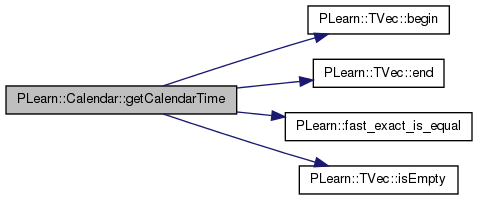

| const Calendar * PLearn::Calendar::getGlobalCalendar | ( | const string & | calendar_name | ) | [static] |
Return a pointer to the global calendar given the string.
Return a NULL pointer if the calendar does not exist
Definition at line 422 of file Calendar.cc.
References global_calendars.
Referenced by remote_getGlobalCalendar(), and PLearn::VMatLanguage::run().
{
map<string,PCalendar>::const_iterator it =
global_calendars.find(calendar_name);
if (it != global_calendars.end())
return (const Calendar*)(it->second);
else
return 0;
}

Given a PDate D, returns the last calendar day in the same month than D.
Note that the first or last date of the calendar are returned whenever the given month is out from the calendar boundaries...
Definition at line 251 of file Calendar.cc.
References getCalendarTime(), PLearn::PDate::lastDateOfMonth(), PLearn::PDate::month, PLASSERT, timestamps_, and PLearn::PDate::toJulianDay().
{
PDate last_day_of_month = day_of_the_month.lastDateOfMonth();
PLASSERT(day_of_the_month.month==last_day_of_month.month);
JTime jtime_ldom = last_day_of_month.toJulianDay();
CTime ctime_ldom = getCalendarTime(jtime_ldom);
// Was first day of the following month returned?
if ( ctime_ldom > 0 && timestamps_[ctime_ldom] > jtime_ldom )
{
ctime_ldom--;
PLASSERT( timestamps_[ctime_ldom] <= jtime_ldom );
}
return ctime_ldom;
}
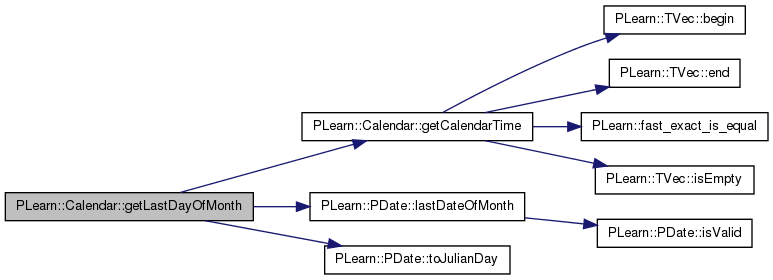
| OptionList & PLearn::Calendar::getOptionList | ( | ) | const [virtual] |
Reimplemented from PLearn::Object.
Definition at line 76 of file Calendar.cc.
| OptionMap & PLearn::Calendar::getOptionMap | ( | ) | const [virtual] |
Reimplemented from PLearn::Object.
Definition at line 76 of file Calendar.cc.
| RemoteMethodMap & PLearn::Calendar::getRemoteMethodMap | ( | ) | const [virtual] |
Reimplemented from PLearn::Object.
Definition at line 76 of file Calendar.cc.
Return the resampling to another calendar or an empty vector if it does not exist.
Definition at line 271 of file Calendar.h.
{ return active_resamplings[other_cal]; }
Returns timestamp corresponding to "calendar_time".
Definition at line 314 of file Calendar.h.
References PLERROR.
Referenced by calendarTimeOnOrAfter(), calendarTimeOnOrBefore(), and convertCalendarTime().
{
if (calendar_time < 0 || calendar_time >= timestamps_.length())
PLERROR("In Calendar::getTime(), argument calendar_time = %d out of bounds.", calendar_time);
return timestamps_[calendar_time];
}

| const JTimeVec& PLearn::Calendar::getTimeStamps | ( | ) | const [inline] |
Returns a reference to the timestamps.
Definition at line 206 of file Calendar.h.
Referenced by operator!=(), and operator==().
{ return timestamps_; }

Return the intersection of a set of calendars.
Definition at line 344 of file Calendar.cc.
References PLearn::TVec< T >::begin(), Calendar(), PLearn::TVec< T >::copy(), PLearn::TVec< T >::end(), PLearn::intersection(), and PLearn::TVec< T >::subVec().
{
PCalendar intersected = new Calendar;
// In the case of shared calendars, the same calendar may be repeated
// multiple times in raw_calendars. Pick out unique copies
set<PCalendar> calendars(raw_calendars.begin(), raw_calendars.end());
if ( !calendars.empty() )
{
set<PCalendar>::iterator it = calendars.begin();
set<PCalendar>::iterator end = calendars.end();
if ( it != end )
{
JTimeVec intersection = (*it)->timestamps_.copy();
JTimeVec::iterator curend = intersection.end();
++it;
for (; it != end; ++it)
{
curend = set_intersection(intersection.begin(),
curend,
(*it)->timestamps_.begin(), (*it)->timestamps_.end(),
intersection.begin());
}
intersected->timestamps_ =
intersection.subVec(0, int(curend-intersection.begin())).copy();
}
}
intersected->build();
return intersected;
}
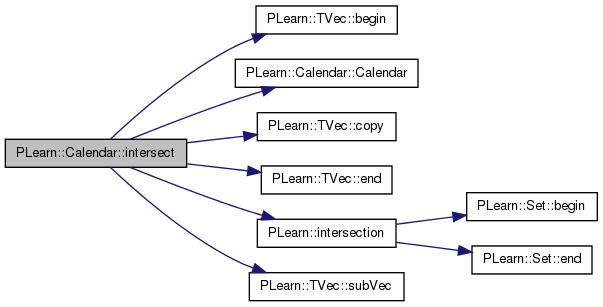
| bool PLearn::Calendar::isEmpty | ( | ) | const [inline] |
Returns true iff this calendar contains no timestamps.
Definition at line 203 of file Calendar.h.
Referenced by convertCalendarTime().
{ return timestamps_.isEmpty(); }

This returns a calendar from a vector of "dates".
The following are supported: YYYYMMDD, CYYMMDD, julian dates. The format is recognized automatically. The dates need not be sorted; they will be sorted automatically.
The storage for the dates vector is copied, thus 'dates' is not altered by this function, and can be safely modified afterwards.
Definition at line 102 of file Calendar.cc.
References Calendar(), PLearn::float_to_date(), i, PLearn::TVec< T >::length(), n, PLERROR, PLearn::TVec< T >::size(), PLearn::sortElements(), and PLearn::PDate::toJulianDay().
Referenced by build_(), main(), remote_setGlobalCalendar(), and PLearn::set_global_calendars().
{
static int Jan1_1900_JDN = PDate(1900,01,01).toJulianDay();
static int Dec31_2199_JDN = PDate(2199,12,31).toJulianDay();
TVec<JTime> jdates(dates.length());
// Start by converting the dates to Julian
for (int i=0, n=dates.size() ; i<n ; ++i) {
real date_i = dates[i];
// YYYYMMDD
if (date_i >= 19000101 && date_i <= 21991231) {
int year = int(date_i / 10000);
int month = (int(date_i) % 10000) / 100;
int day = int(date_i) % 100;
jdates[i] = PDate(year,month,day).toJulianDay();
}
// CYYMMDD (up to 2099/12/31, since 1900/01/01 == JDN-2415021)
else if (date_i >= 000101 && date_i <= 1991231) {
jdates[i] = float_to_date(date_i).toJulianDay();
}
// Otherwise check it's in the proper range for a JDN
else if (date_i < Jan1_1900_JDN ||
date_i > Dec31_2199_JDN)
PLERROR("The date value '%g' at index %d could not be interpreted\n"
"as a date in YYYYMMDD, CYYMMDD or JDN in the 1900/01/01 to\n"
"2199/12/31 range.", date_i, i);
else
jdates[i] = JTime(date_i);
}
// Next sort by increasing value...
sortElements(jdates);
return new Calendar(jdates);
}
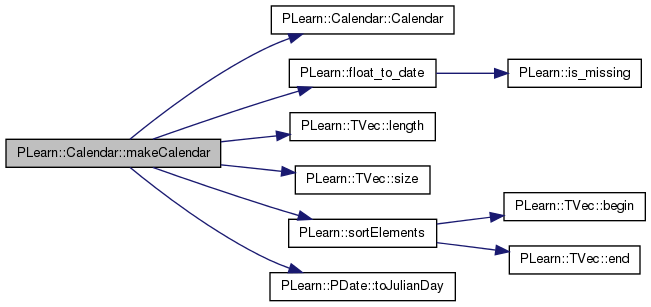

| void PLearn::Calendar::makeDeepCopyFromShallowCopy | ( | CopiesMap & | copies | ) | [virtual] |
Transforms a shallow copy into a deep copy.
Reimplemented from PLearn::Object.
Definition at line 222 of file Calendar.cc.
References PLearn::deepCopyField(), PLearn::Object::makeDeepCopyFromShallowCopy(), and timestamps_.
{
inherited::makeDeepCopyFromShallowCopy(copies);
deepCopyField(timestamps_, copies);
}

Returns true iff the calendar has different timestamps.
Definition at line 213 of file Calendar.h.
References getTimeStamps().
{ return (timestamps_ != cal.getTimeStamps()); }

Returns true iff the calendar have the exact same timestamps.
Definition at line 209 of file Calendar.h.
References getTimeStamps().
{ return (timestamps_ == cal.getTimeStamps()); }

Definition at line 321 of file Calendar.h.
{
return getTime(calendar_time);
}
| JTimeVec PLearn::Calendar::remote_getGlobalCalendar | ( | string | calendar_name | ) |
< Shut up compiler
Definition at line 439 of file Calendar.cc.
References getGlobalCalendar(), PLERROR, and timestamps_.
Referenced by declareMethods().
{
const Calendar* cal = getGlobalCalendar(calendar_name);
if (! cal) {
PLERROR("Global calendar '%s' not found", calendar_name.c_str());
return JTimeVec();
}
else
return cal->timestamps_;
}


| void PLearn::Calendar::remote_setGlobalCalendar | ( | string | calendar_name, |
| Vec | calendar_dates | ||
| ) |
Definition at line 433 of file Calendar.cc.
References makeCalendar(), and setGlobalCalendar().
Referenced by declareMethods().
{
setGlobalCalendar(calendar_name, makeCalendar(calendar_dates));
}


| void PLearn::Calendar::setGlobalCalendar | ( | const string & | calendar_name, |
| PCalendar | calendar | ||
| ) | [static] |
Set a global calendar keyed to the given string.
Definition at line 412 of file Calendar.cc.
References calendar_name, global_calendars, and PLERROR.
Referenced by main(), remote_setGlobalCalendar(), and PLearn::set_global_calendars().
{
if (calendar_name != "")
global_calendars[calendar_name] = calendar;
else
PLERROR("Calendar::setGlobalCalendar: the calendar name must be specified");
}

| void PLearn::Calendar::setResampling | ( | Calendar * | other_cal, |
| const TVec< int > & | resampling | ||
| ) | [inline] |
Associate or modify a resampling to another calendar.
Definition at line 266 of file Calendar.h.
{ active_resamplings[other_cal] = resampling; }
| int PLearn::Calendar::size | ( | ) | const [inline] |
Returns the number of timestamps.
Definition at line 217 of file Calendar.h.
Referenced by clamp().
{ return timestamps_.length(); }

Return the union of a set of calendars.
Definition at line 317 of file Calendar.cc.
References PLearn::TVec< T >::begin(), Calendar(), std::copy(), and PLearn::TVec< T >::end().
{
PCalendar united = new Calendar;
// In the case of shared calendars, the same calendar may be repeated
// multiple times in raw_calendars. Pick out unique copies
set<PCalendar> calendars(raw_calendars.begin(), raw_calendars.end());
if (!calendars.empty())
{
set<JTime> timestamps;
for (set<PCalendar>::iterator it = calendars.begin(); it != calendars.end(); ++it)
{
set_union(timestamps.begin(), timestamps.end(),
(*it)->timestamps_.begin(), (*it)->timestamps_.end(),
inserter(timestamps, timestamps.begin()));
}
united->timestamps_.resize(int(timestamps.size()));
copy(timestamps.begin(), timestamps.end(), united->timestamps_.begin());
}
united->build();
return united;
}
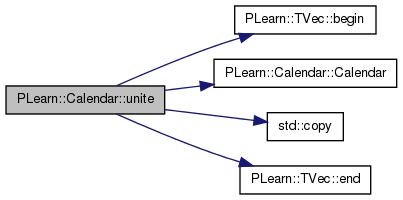
Reimplemented from PLearn::Object.
Definition at line 191 of file Calendar.h.
map< Calendar*, TVec<int> > PLearn::Calendar::active_resamplings [protected] |
Internal map containing memoized resamplings for the calendar.
The interpretation is as follows: for each calendar c in the map, we have a vector of integers v_c. The entry v_c[i] indicates what would be the index in calendar c of the index i in this calendar.
Definition at line 143 of file Calendar.h.
Alternative list of "human timestamps" that may be provided in any of the following formats: Julian, CYYMMDD, YYYYMMDD.
The format is recognized automatically. The dates need not be sorted; they will be sorted automatically. After construction of the calendar, the option 'timestamps' is filled out with the converted Julian timesteps.
Definition at line 159 of file Calendar.h.
Referenced by build_(), and declareOptions().
map< string, PP< Calendar > > PLearn::Calendar::global_calendars [static, protected] |
The set of currently-installed global calendars.
Definition at line 146 of file Calendar.h.
Referenced by getGlobalCalendar(), and setGlobalCalendar().
CTime PLearn::Calendar::last_calendar_time_ [mutable, protected] |
Value returned by last call to getCalendarTime.
Definition at line 134 of file Calendar.h.
Referenced by getCalendarTime().
JTime PLearn::Calendar::last_julian_time_ [mutable, protected] |
Input value to last call to getCalendarTime.
Definition at line 131 of file Calendar.h.
Referenced by getCalendarTime().
bool PLearn::Calendar::last_use_lower_bound [mutable, protected] |
Last argument used when calling getCalendarTime.
Definition at line 137 of file Calendar.h.
Referenced by getCalendarTime().
The list of julian timestamps that define this calendar.
Definition at line 150 of file Calendar.h.
Referenced by build_(), calendarDiff(), clamp(), containsTime(), declareOptions(), getCalendarTime(), getLastDayOfMonth(), makeDeepCopyFromShallowCopy(), and remote_getGlobalCalendar().
 1.7.4
1.7.4